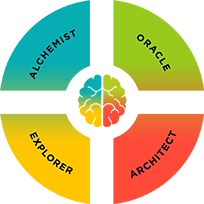Intro & Bolded Text Reading Time: 2 minutes.
Full Content: 13 minutes.
One aha moment can change your life. It did for me. I’ve gone back and forth on whether to write this piece for a long time. There are thousands all over the interwebs, and in my clearly opinionated opinion — 99% of them are junk.
I’m certain of this, because I typed these same words into Google search when I first started out as a solopreneur: “online business”. Even so, I know this is something that needs to get addressed properly and I owe you an honest answer.
This is an attempt to provide a comprehensive, factual, and actionable guide to the popular question of what the best online businesses are. My goal is simple: to not fall into the 99% garbage pile.
Let’s start with some straight-forward, important truths:
- The only way to build a real business (and eventually quit your day job if you choose) is with patience and perseverance. It’s all about taking tiny steps each day.
- There is no such thing as overnight success or getting rich quickly. I promise, no matter how amazing the opportunity looks, you are wasting your time. These aren’t real businesses, and they don’t provide real wealth. When they do, they’re temporary and fade quickly. Plus, the rich know that the idea is to build assets, not make cash.
- Working for yourself doesn’t have to be complicated. We make it that way because we get distracted and lose focus. How do you prevent this? Cure your procrastination for good and develop laser focus on one thing.
- If you invest your time and energy into more than one area, you won’t get anywhere. You must choose only one. Dedicate yourself to it, and settle for nothing less than mastery.
- With a traditional venture-backed business, there is a risk of failure. If you squander your investor funding, you fail. As a solopreneur, the only way you can fail is by giving up. So do the work.
Finally, read about my 7 biggest mistakes, and promise me you won’t make them too.
Okay…ready to dive in? Here are the top 15 online businesses for existing and aspiring solopreneurs and entrepreneurs (in no particular order):
Products
1. Physical Products
This business is where most people want to start (or think they should) by default. It’s the one that actually makes sense to the first-time solopreneur. Creating the next hot product is an exciting journey that is great for the creative solopreneur.
A lot of work, cost, learning, and dedication will be involved. Working with a partner may be helpful in this business. If you have a strong desire to see your product become a reality, you will have a great time with this.
Where to Start:
Validate your idea. Talk to real humans and get feedback until you’re positive people need this. Make sure it solves a pain/need.
Then, validate again. The easiest way to do this is by creating a blog or website for the product. Put up a landing page with photos and details for the product, and push some traffic to it (paid traffic is faster, but you should also look into content marketing and social media).
On the page, ask people to opt in and give you their email address so you can notify them when the product is ready for testing. If you gather a lot emails, you’re probably onto something. Harry’s has a
Harry’s has a fantastic case study on how they gathered 100,000 emails in one week for their launch. Another excellent resource is the The 4 Hour Workweek by Tim Ferriss, specifically the sections on finding your niche, or “muse” as he calls it.
2. Online Retail/Amazon/E-commerce
The online retail/e-commerce niche is enormous, and growing. Potential to scale is high, with many people creating six-figure or more niche product businesses on Amazon. There is a wealth of knowledge, resources, and community in this area.
E-commerce is another great example of passive income. But it does require a lot of up experimentation, upkeep, and dedication in the beginning. If you strike the right niche/market and deliver a hot product, you can find success.
You can also sell products through your own online store. The products never even have to be touched by you, there are many ways to have the fulfillment handled by someone else and have products drop shipped directly to the customer.
So, you can either go the Amazon/eBay/Etsy route, or create your own e-commerce store. It just depends on your goals.
Best E-Commerce Platforms
- Shopify
- BigCommerce
- WooCommerce (for hosting on your own WordPress site)
If you’re looking for education, I recommend checking out Amazing.com, the creators of the sensational Amazing Selling Machine program.
3. Mobile Apps
This industry is not showing any signs of slowing down soon. The landscape is constantly evolving too, which means lots of opportunity for the dedicated student.
You do not need to know how to code/program to become an app entrepreneur. In fact, we already have a free 8 day business plan you can use if you’re interested in getting started with apps.
Who to Know: Without a doubt, there are two people I recommend you follow in this space. The first is Carter Thomas of Blue Cloud Solutions. Carter has an awesome free webinar you can check out for getting started and has gotten tens of millions of downloads.
The other is my close friend Chad Mureta, founder of App Empire. Chad has had incredible success with apps (over 150 million downloads), and has been featured on 60 Minutes, MSNBC, and more. All the information, tools, resources, and networking you need is available inside this large community of app entrepreneurs.
4. Software
Creating a piece of software or Saas is a fantastic way to start an online business, and you don’t have to create it yourself. This true passive income model can open the doors to more opportunities as well.
Your software should provide an immediate solution to a pain or need for a niche of people. The software can be standalone (e.g. CrazyEgg), or it can supplement another software or service (e.g. AWProTools, an add-on for Aweber).
Personally, I like this model a lot. There is lots of room to scale, and you can also cross-sell and upsell other products and services on the backend.
Who to Know: Neil Patel, founder of Kissmetrics, HelloBar, and CrazyEgg is the person to know. I’ve worked directly with Neil on multiple projects and I can tell you with certainty — he is the real deal. He has one of the best blogs out there at NeilPatel.com and Quicksprout, where he shares a lot of his most valuable lessons and strategies.
You should also definitely check out Dane Maxwell and The Foundation. His online mentoring program has guided 1,600+ new entrepreneurs to start and scale software companies, and the community continues to thrive. He’s an incredible person on a grand mission.
5. Art
Online business is not limited to just the technical, internet savvy folks. If you are passionate about a particular form of art, you can turn this into a successful business.
The possibilities are wide and many. Photography, videography, art, crafts, and so on. If your art is something you feel drawn toward, pursue it. How you monetize is completely up to you.
Who to Emulate:
- James Law. My friend James went from disillusioned sales/marketing guy, to world-traveling UFC photographer. It’s an incredible story and case study, check it out here.
- David Huting. When I was at Google, I worked with a solopreneur photographer named David who created a brand and product called Epic Wall Art. He takes photographs of amazing places, blows them up on giant canvases, and sells them on a website. He has since created a new brand called Nature Relaxation, this time using video.
Services
6. Consulting/Coaching
Productivity, business, social media, health/fitness, financial/wealth, life — the options are endless. Consulting or coaching has a low barrier to entry, requires little technical work, and is a quick way to get started. It can also be completely virtual (online).
Consulting requires that you are an expert in the niche your choosing. I italicized expert because expertise is relative; e.g. as long as you know more than me about fitness, in my eyes, you’re an expert. And there’s value in that, which people are willing to pay you for.
There are many solopreneurs with successful consulting businesses. I have my own and while it took some time to build, today I have a waiting list of clients and get raving referrals. I’ve worked with people like Timothy Sykes (celebrity stock trader), Lewis Howes (NYT bestselling author), Neil Patel (co-founder of Crazy Egg, Quicks Sprout, etc.), Gerard Adams (co-founder of Elite Daily), and helped companies like Whitepages, Qualaroo, 24option, Qualaroo, and Xenon Ventures (a VC firm in Silicon Valley).
You can even do coaching for individuals, sites like Clarity.fm are awesome for this, check out my Clarity page here. If you like working with people and have some value to bring, this might be a good option for you.
7. Design
The design industry is a big opportunity for the right person. If you have a knack for creating aesthetically pleasing work, you can be successful here. If you are willing to learn some basic technical skills, you’ll do even better.
The quality of work designers are delivering across the board is low. There is a strong need for web design. You could combine your design skills with some WordPress development.
Some Popular Sites for Hiring Designers:
Once your portfolio is built and you have some happy clients, you can begin to shift from being hired to being in demand. Learn how to market yourself and soon you can start your own virtual design agency.
8. Copywriting
One of the most in-demand, valuable skills you can have is copywriting. Think of it as a combination of writing, marketing, sales, and psychology. People pay very good money for a good copywriter’s work. Every entrepreneur is forced to either learn this skill or hire someone to handle it.
You can begin by freelancing on sites like Upwork to build a list of happy clients — this is exactly what I did. Again, do good work, get referrals, and the demand will shift your way.
Who to Emulate: Mike Williams is a highly sought after copywriter and friend of mine. He’s worked with/at Mindvalley, Kissmetrics, AWeber, Neil Patel, Noah Kagan, and Ramit Sethi.
You should also check out…me. What? I had to. There’s a reason Neil Patel says:
“Arman is a brilliant, world-class marketing strategist and copywriter. He’s also one of the most driven and down-to-earth people I’ve ever met.” – Neil Patel
9. Software development
Programming is the new literacy. — Tweet this!
At least that’s what Mark Zuckerburg and Bill Gates are saying. Programming isn’t for everyone (definitely not for me), but it’s the biggest and most reliable opportunity. You will want to focus on web development and mobile applications.
Just to be clear, you can get started and make a living by learning some HTML/CSS and getting familiar with WordPress.
The more you learn, the more in demand you’ll be. Better yet, you could create anything you wanted for yourself. Pick a programming language and master it. There are many, many places you can learn to code.
Where to Learn (for Free):
- Code Academy (over 24 million students)
- Coursera
- Code.org
Just imagine the opportunities a bit of online and offline networking can bring you.
Prospect: “Hey John, I have this idea for a mobile app, but I have no idea where to start!”
You: “No problem — that’ll be $10,000 please.” You get the idea.
10. Speaking
A fantastic opportunity for the right person. If you enjoy getting in front of people and delivering your content, a speaking business could be for you. The online piece of the business doesn’t have to be complicated.
You can’t however just throw up a website with a speaking page and expect the phone to start ringing. I did this. I know, very amusing, but don’t laugh too much. It was those all damn over-promise, under-deliver articles that told me this would work (refer to the “99% garbage” comment in intro).
First, you’ll need to master the art of speaking, start with these 11 quick lessons. You’ll need to start practicing right away (probably for free), get videos of your speeches, and put together a presentable speaking packet. Then you’ll need to work on building a personal brand. Work hard and hustle, you could soon be on your way to a great business.
Where to Learn:
- Toastmasters – The most highly recommended place for polishing up your speaking skills. There are Toastmasters meet ups in most cities.
- National Speakers Association – A great resource and network for getting started.
Who to Know:
- Michael Hyatt is a successful author, solopreneur, podcaster, and speaker. His speaking page is excellent.
- Matt Church is a leader in the area of Thought Leadership. He has many resources and training programs to help you build your speaking business.
11. Affiliate/Internet Marketing
This is an enormous online business industry, and I probably shouldn’t chunk the two categories together. Affiliate Marketing is where a business rewards you (the affiliate) for bringing them new leads or customers. This can feel like a roller coaster ride because you’re hoping you’ll hit the jackpot with your offer. Many people crash and burn, but the persistent survive and make a great living.
Internet Marketing involves is simply using the internet to deliver a message (marketing) to potential customers. There is more control, but it’s a different strategy. You can create your own products/offers, or simply promote other people’s work. The key is building an email list of raving fans (this isn’t important just for internet marketing by the way).
Where to Learn:
- Digital Marketer: This company is the leader in online marketing. They have awesome courses/programs and do a few different live events that I always enjoy attending.
- Neil Patel’s free Customer Acquisition Webinar: This is a truly valuable, action-focused webinar you can watch to learn Neil’s best hacks on everything related to internet marketing and turning prospects into customers.
- Autoresponder Madness (ARM): I highly recommend checking out this course. ARM taught me how to develop a real relationship with my readers, create raving fans, and monetize effectively.
- CopyBlogger: Internet Marketing for Smart People: A great free resource that was created by a trustworthy, successful group of folks.
Education/Information
12. Courses/Information Products & Membership Sites
Creating a course, information product, or membership site is a fantastic way to start an online business. My first venture into online business was creating an information product on email management and productivity. Since then my training programs have been implemented into companies like Intel, T-Mobile, IMB, 1-800-Flowers.com, and Century 21.
This is actually a publishing business, as you’re creating and selling information/content. The learning curve is steep. You will need to learn a lot of new skills and gain a strong understanding of marketing and sales. It is important that you learn from the right person.
An online business course or membership site is an excellent asset. There are many examples of people continuing to sell their products for years after launching, especially if the content is evergreen. I believe information is the key to business success in the future.
Udemy has a great free course on how to create your first course. Whether you use Udemy as your platform or not is up to you. Publishing the course on your own website is a good idea as you have more control. But publishing on a site like Udemy is also smart as they have a massive marketplace and the technical aspects are easier. The key to remember is that marketplaces are competitive, and any existing users do not guarantee sales.
Who to Know: There are a lot of people teaching this, but my favorite human is Eben Pagan. His free content (get on his email list) is better than everyone else’s paid content, and his success speaks for itself — tens of millions of dollars in sales, dozens of courses, and a massive virtual organization. You want to learn from the best, and he is the best.
13. Blogging
First of all, regardless of what business you pursue, I highly recommend that you have a blog or personal website. Why? So that you can begin to create a personal brand (see bonus below) and build an email list.
A blog is not a business in and of itself. A blog is the platform that enables many of the other businesses listed (courses/products, podcasts, books, consulting, etc.)
Most people don’t make money blogging (I would estimate over 75%). The ones that do have been working at it for years. If you love to write, make videos, or create any form of content, publishing on a blog is a great idea. Start by sticking to a consistent publishing schedule, and creating useful, valuable, actionable content.
Get Started: How to Launch a Blog or Website in Under One Hour
If you’re less interested in the writing and more serious about starting a profitable blog/authority site, there is a way. It’s not with blogging, it’s about building a media property (see Authority ROI below).
Where to Learn:
- Authority ROI is the best training I’ve come across. I highly recommended the course, and have been through it myself.
- The Complete Guide to Building Your Blog Audience – This free complete guide by Neil Patel is one of those “I wish I had known about this” things. You will be far ahead of the rest if you implement what Neil shares in this guide.
If you enjoy writing, another option is to work as a freelancer. You can create content for small businesses, write for authority sites, magazines, and other people’s blogs.
Who to Know: Chris Guillebeau of The Art of Non-Conformity, James Clear of JamesClear.com, Pat Flynn of SmartPassiveIncome.com, and Tim Ferriss of Four Hour Workweek Blog.
14. Self-Publishing/Writing
There’s a revolution happening right now in the publishing world. With the explosion of self-publishing, you now have the power to create, publish, and promote your own work. The power is moving from traditional publishers into the hands of people like you.
If you enjoy creating content/writing, a self-publishing business can be very exciting and lucrative. As with all businesses, it comes with its challenges. Here’s the biggest tip I can share with you:
The day you finally decide you’re a writer and act like one — everything changes. — Tweet this!
You can publish ebooks on Kindle — here’s a free downloadable guide on that. You can publish on Apple Newsstand (digital magazine). You can self-publish a book and sell it on your own site — there is a lot of flexibility.
Who to Know:
- Jeff Goins – Jeff has a fantastic blog, podcast, books, and a lot of content on self-publishing. He also has a course specifically on finding an audience for your work called Tribe Writers.
- Guy Kawasaki – Guy has multiple bestselling books and is an excellent person to learn from. His most recent book APE: Author, Publisher, Entrepreneur is highly rated and recommended.
- James Altucher – James is a successful self-published author and blogger. His post How to Self-Publish a Bestseller: Publishing 3.0 is an excellent guide.
15. Podcasting
You may have heard already — podcasting is blowing up. Podcasting is similar to blogging, in that it is not a business in and of itself. However, it can be approached as one if viewed as a media platform and extension of your brand.
You can monetize through sponsorships, and/or use as the platform to reach a new audience and create brand awareness. You can drive traffic to your website, sell your products and services, and create new opportunities.
Podcasting is an exciting space, and for the right person, it’s a no-brainer. There’s a lot to learn, and getting set up can be confusing.
Where to Learn:
- John Lee Dumas of the Entrepreneur on Fire podcast. John interviews successful entrepreneurs seven days a week, but he is truly on fire himself. He has an amazing free webinar training, and even a free course, on how to create, grow, and monetize your podcast. His community, Podcasters Paradise, is the best out there on this topic.
- Pat Flynn of The Smart Passive Income podcast. Pat is an honest, likable family man that wants his audience to succeed. He has a free How to Start a Podcast tutorial on his site that includes everything you need to get started.
Bonus: Personal Brand
I’ve listed this one as a bonus on purpose. We have to be careful because I don’t want you to solely focus on the personal brand itself as the business. A personal brand is something you build over time. Your business(es) should all lead back to your brand.
Software, a YouTube channel, social media, books, courses/information products, podcasting, speaking, webinars, services, live events, and much more. Each new business or property feeds back into the personal brand. Why do this?
Your personal brand is an asset no one can never take away. Investing in your brand is critical and highly recommended.
It is not necessary to have a personal brand, but it is recommended. Your business may go away, but your brand won’t. You could potentially start an online business, make a living, and never show your face to the world. That, I leave up to you.
Who to Know: Lewis Howes (lifestyle entrepreneur, podcaster), Gary Vaynerchuk (video blogging, social media), Chris Brogan (entrepreneur and publisher/author), Jeff Bullas (social media marketing expert), and Neil Patel.
##
After years of researching, experimenting, and learning, these are my most recommended ways for building a solopreneur online business and making money online. All of them take work. All of them will test you to your limits.
But most importantly, all of them can provide the freedom you desire.
More than anything, each one of these businesses has integrity. They give you the opportunity to bring value and contribute to the world. They are paths to long-term fulfillment. If you can align yourself and your passions with your business, you will be one happy camper.
Do you know someone who wants to start an online business, but doesn’t know where to start? Share this post with them so they can learn about the best options for getting started. They’ll thank you for it!
Photo credit: Idea — CC License






